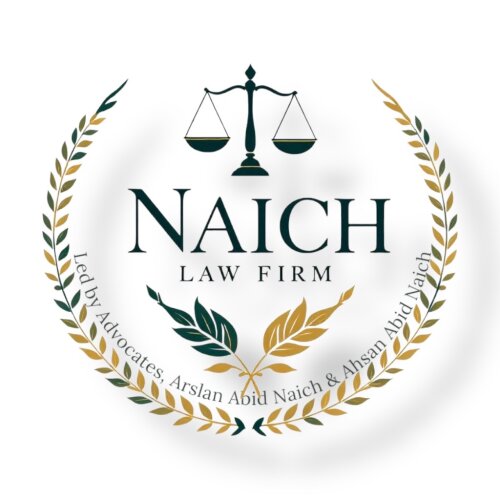Best Information Technology Lawyers in Karachi
Share your needs with us, get contacted by law firms.
Free. Takes 2 min.
List of the best lawyers in Karachi, Pakistan
About Information Technology Law in Karachi, Pakistan
Information Technology (IT) law in Karachi, Pakistan, is a rapidly evolving field that reflects the global trends in digital innovation and cybersecurity. Karachi, as the financial and technological hub of Pakistan, plays a crucial role in the country's IT landscape, where numerous businesses and startups operate. IT law in the region covers various aspects including data protection, privacy, intellectual property, e-commerce, and cybercrime. The legal framework aims to protect organizations, individuals, and the integrity of electronic transactions, ensuring that the rapidly growing IT sector can flourish while safeguarding consumers' and businesses' rights.
Why You May Need a Lawyer
There are several situations where individuals or companies may require legal assistance in the realm of IT in Karachi. Some of these include:
- Advice on data protection and ensuring compliance with local and international standards.
- Guidance on intellectual property rights related to software, digital content, and technological innovations.
- Legal representation in cases of cybercrime, whether as a victim or defendant.
- Assistance with drafting and reviewing contracts related to IT services, software licensing, and technology partnerships.
- Support in disputes related to e-commerce transactions or digital service agreements.
Consulting with an IT lawyer can help navigate these complex issues and ensure that the legal standing of both individuals and businesses is protected.
Local Laws Overview
The IT legal landscape in Karachi is shaped significantly by the legislation and policies enacted by the government of Pakistan. Key laws include:
- Prevention of Electronic Crimes Act (PECA) 2016: This is a comprehensive law aimed at enhancing cybersecurity and dealing explicitly with crimes committed in the digital space, such as hacking, unauthorized access, and cyberstalking.
- Electronic Transactions Ordinance 2002: Provides the legal framework for the recognition and facilitation of electronic transactions and digital signatures, contributing to secure online commerce.
- Data Protection: While broad legislation akin to GDPR does not exist yet, there are sector-specific regulations that govern the handling of personal data and privacy.
Understanding these laws is essential for operating within the legal framework of Pakistan’s IT sector and safeguarding against legal issues.
Frequently Asked Questions
What is the significance of IT law in Karachi?
IT law in Karachi governs the relationship between technology and legal principles, helping to manage risks associated with digital technologies and facilitate smooth operation of tech businesses.
How can I protect my digital startup in Karachi legally?
To protect your startup, consider consulting a lawyer for structuring your business, registering your intellectual property, drafting clear terms of service, and ensuring compliance with local IT laws.
What legal issues are common for e-commerce businesses in Karachi?
Common legal issues include consumer protection rights, payment security, data privacy concerns, and clear return/refund policies. Legal advice is critical in drafting comprehensive e-commerce agreements.
How is intellectual property handled in IT sector in Karachi?
Intellectual Property in Karachi is protected under trademark, patent, and copyright laws. Legal guidance can ensure proper registration and protection of software and digital content.
Is there a law regarding cyberbullying in Karachi?
Yes, the Prevention of Electronic Crimes Act (PECA) 2016 includes provisions against cyberbullying and cyberstalking, with measures to protect individuals from online harassment.
What are the penalties for cybercrime under Pakistani law?
Penalties for cybercrime can range from fines to imprisonment, depending on the severity of the offense. Legal advice can be crucial for defense or restitution in such cases.
Can I use electronic signatures for my business transactions?
Yes, electronic signatures are legally recognized in Pakistan under the Electronic Transactions Ordinance 2002, facilitating digital agreements and transactions.
What should I know about data protection for my IT business?
While comprehensive data protection laws are still developing, it’s essential to comply with any industry-specific regulations and to establish data privacy practices within your organization.
How do I resolve a dispute over an IT contract?
Dispute resolution can involve negotiation, mediation, arbitration, or litigation. An experienced IT lawyer can help determine the best course of action and represent your interests effectively.
How does cybersecurity law affect my company?
Your company is responsible for maintaining adequate cybersecurity measures to protect data and avoid breaches. Failure to comply with cybersecurity laws can result in significant legal consequences.
Additional Resources
For further guidance, consider reaching out to the following resources:
- Pakistan Software Houses Association (P@SHA) - Offers support for software and IT services companies across Pakistan.
- National Response Centre for Cyber Crime (NR3C) - A government body dealing with cybercrime and offering guidance on digital safety.
- Ministry of Information Technology & Telecommunication - Provides updates on IT policies and regulations in Pakistan.
Next Steps
If you need legal assistance in the IT field, consider the following steps:
- Consult with a legal expert who specializes in IT law to understand your specific needs and issues.
- Gather all relevant documentation and information that pertains to your legal concern.
- Discuss potential courses of action with your lawyer to formulate a strategy that aligns with your objectives.
- Stay informed about changes in IT law to proactively manage your legal requirements and minimize risks.
Taking these steps can help you navigate the complexities of IT law and secure your interests effectively.
Lawzana helps you find the best lawyers and law firms in Karachi through a curated and pre-screened list of qualified legal professionals. Our platform offers rankings and detailed profiles of attorneys and law firms, allowing you to compare based on practice areas, including Information Technology, experience, and client feedback.
Each profile includes a description of the firm's areas of practice, client reviews, team members and partners, year of establishment, spoken languages, office locations, contact information, social media presence, and any published articles or resources. Most firms on our platform speak English and are experienced in both local and international legal matters.
Get a quote from top-rated law firms in Karachi, Pakistan — quickly, securely, and without unnecessary hassle.
Disclaimer:
The information provided on this page is for general informational purposes only and does not constitute legal advice. While we strive to ensure the accuracy and relevance of the content, legal information may change over time, and interpretations of the law can vary. You should always consult with a qualified legal professional for advice specific to your situation.
We disclaim all liability for actions taken or not taken based on the content of this page. If you believe any information is incorrect or outdated, please contact us, and we will review and update it where appropriate.













